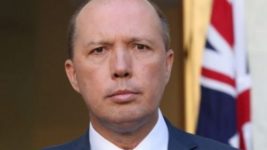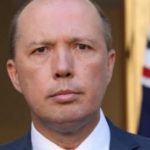Dutton Continues to Build the Surveillance State

Right before the COVID-19 pandemic forced the nation into lockdown, home affairs minister Peter Dutton introduced a new piece of legislation into parliament that would allow foreign security agencies to access the private data of Australian citizens.
Currently under review, the International Production Orders Bill would establish a framework allowing agents to require designated communication providers both here and abroad hand over stored metadata and communications, as well as providing the authority for wiretapping operations.
But, then Peter Dutton became one of the first victims of the novel coronavirus in this country, when he tested positive on 13 May. And besides a few public announcements about his health, the minister subsequently seemed to be missing in action.
The was until a shutdown federal parliament reconvened for three emergency sitting days a fortnight ago, and the former Queensland cop stepped up to reveal a new piece of legislation that would dramatically increase the powers of Australia’s domestic spying agency.
And this showed that Dutton’s COVID moment was nothing but a brief hiatus and meanwhile, beneath the cover of the pandemic, the minister was busy drafting new laws relating to his major work, which is turning this nation into an advanced surveillance state.
Access all areas
“Minister Dutton seems to have a production line of repressive bills ready to trot out at the slightest opportunity,” said Civil Liberties Australia (CLA) CEO Bill Rowlings. “This process has been going on for years. Rights and liberties are being whittled away by waves of legislation.”
A recent standout that Dutton was responsible for is 2018’s Assistance and Access Bill. Digital rights advocates had long warned of laws providing backdoor access to platforms using encryption, however with this, the minister managed to pass laws that get in through the main entrance.
The bill established a three-tiered system requiring designated communications providers to allow access to their systems, with the third avenue involving the attorney general notifying a provider that it must build a capability that allows authorities to access the data inside.
During his second reading speech on this bill, minister Dutton cited terrorists, criminal syndicates and those accessing “child exploitation and pornography” materials, as the reasons for the encryption-busting laws.
However, some of the legislation’s provisions have since been used on journalists.
“The bills always supposedly target the biggest baddies,” Rowlings told Sydney Criminal Lawyers, “but the laws apply to ordinary Australians going about their business.”
Broadening reach
Minister Dutton’s latest Frankenstein monster is the ASIO Amendment Bill that for some reason he found necessary to introduce into parliament whilst the nation was still locked down and dealing with the COVID-19 crisis.
This legislation enhances ASIO’s existing questioning regime to allow officials to detain people as young as 14 for questioning and removes the need for independent warrants to track citizens, while allowing agents to bar lawyers they don’t like or remove those they find too unruly mid-questioning.
“It’s obvious that the government wants to increase internal spying and surveillance within Australia,” Mr Rowlings made clear. “That’s what the current ASIO bill does.”
“It’s what was behind the AFP raid on journalist Annika Smethurst, when she blew the whistle on a proposal for the Australian Signals Directorate (ASD) to monitor the emails, bank accounts and text messages of Australians, if approved by ministers,” the civil liberties advocate added.
Last June’s raid on Smethurst’s house related to an article the journalist published in mid-2018 detailing correspondence between the secretaries of the defence and home affairs departments discussing plans to turn the nation’s international spying agency, the ASD, upon domestic targets.
The truth behind the ASD proposal has long been denied, as well as admitted to, by government. And most recently, minister Dutton told the ABC right before the onset of the pandemic that the plan to allow the foreign threat-focused agency to spy on locals is close to finalisation.
The Capability
But, it doesn’t stop there. Dutton “has another bill in his back pocket, which he began consultations on in early 2019, then suddenly stopped”, according to Rowlings. And this legislation would enable vigilante groups to run “former paedophiles who have completed their sentences” out of town.
The home affairs minister announced in January last year that he proposes establishing a national public register of child sex offenders online, which is a model that hasn’t been beneficial in jurisdictions elsewhere in the world where it’s been rolled out.
And the cherry on the top of Dutton’s burgeoning surveillance state would be the establishment of the Capability, which is a national facial recognition database allowing for the matching of all citizens’ identification photos with images taken from CCTV cameras in real time.
The legislation relating to this scheme is in limbo, after a parliamentary committee rejected the laws as being too invasive. However, Dutton has insisted the government will be pressing ahead with legislating for the Capability, which he maintains has nothing to do with mass surveillance.
Before it’s too late
“Dutton was once a policeman,” Rowlings said. “He seems determined to turn Australia into a police state, and he’s succeeding.”
But, despite the home affairs minister being the foremost architect of the surveillance state at present, this project, which has entailed the passing of numerous rights-eroding laws, began years before Peter Dutton stepped into parliament.
In mid-March, the tally at the UNSW Law School showed that 85 pieces of counterterrorism legislation have been passed with bipartisan approval at the federal level since 9/11. And these contain the laws that have been encroaching upon liberties and building the surveillance state.
Although, as far as Rowlings is concerned, Dutton’s endgame isn’t a given. He points out that security agencies around the globe are now acknowledging that Islamic-backed terrorism is in decline, while the threat of white nationalism is on the rise.
And he suggests that a post-September 11 review of national security laws is way overdue.
“We need to overturn the laws which enable security agency excesses and the scrapping of freedoms,” Mr Rowlings concluded, “and recast a new and coherent set of provisions, which balance rights and liberties against the new anti-privacy, surveillance state.”







